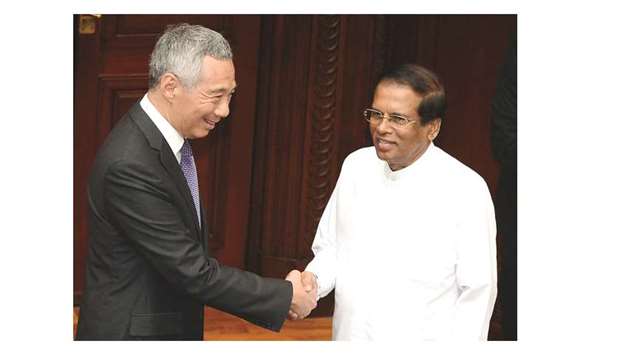Both countries’ trade ministers signed the deal at an event attended by Singapore Prime Minister Lee Hsien Loong, who is on a three-day official visit to Colombo, and Sri Lankan
President Maithripala Sirisena.
“It signals to the world that the country is moving to a new era in international trade and investment,” Sri Lanka’s trade ministry said in a statement.
“While we focus on growing and sustaining our traditional markets of the United States and Europe, we have begun to diversify our markets towards Asia and focus on plugging in to Asian supply chains.”
Sri Lanka’s exports rose around 9% to $9.4bn in the first 10 months of 2017, up from the corresponding period the
previous year.
Total exports have declined to around 13% of gross domestic product, from more than 20% two decades ago, hit by lack of export diversification and falling demand.
Sri Lanka’s exports to the United States have fallen to 20% in 2016, from 27% in 2011, while exports to European nations and the United Kingdom also fell to 31% from 35% over the same
period.
A lack of dollar inflows coupled with increased spending on infrastructure had pushed Sri Lanka into expensive borrowing.
It needs to repay a record high of an estimated Rs1.97trn ($12.85bn) in 2018, including $2.9bn of foreign loans, mainly from China, and a total of $5.36b in interest.
Sri Lanka is participating in China’s One Belt One Road (OBOR) initiative. China has already leased a strategic port in the southern city of Hambantota and is building a financial city near the main port in Colombo, the capital, with an investment of $1.4bn.
Global investors have expressed interest in investment in Sri Lanka, which is strategically located on the east-west shipping route of the Indian Ocean.
The FTA has potential for diversification of exports through the trade-investment nexus it encourages and new joint venture opportunities for Sri Lankan companies, the trade ministry said.
The services sector in the pact is wider than in proposed pacts with China and India, including telecommunications, financial services,
e-commerce, and procurement.
Sri Lanka, with a population of 20mn, is already in discussion with China and India for similar comprehensive pacts to tap more than 2bn consumers.
Singapore Prime Minister Lee Hsien Loong, left, shakes hands with Sri Lankan President Maithripala Sirisena during a welcoming ceremony at the Presidential Secretariat in Colombo yesterday.

